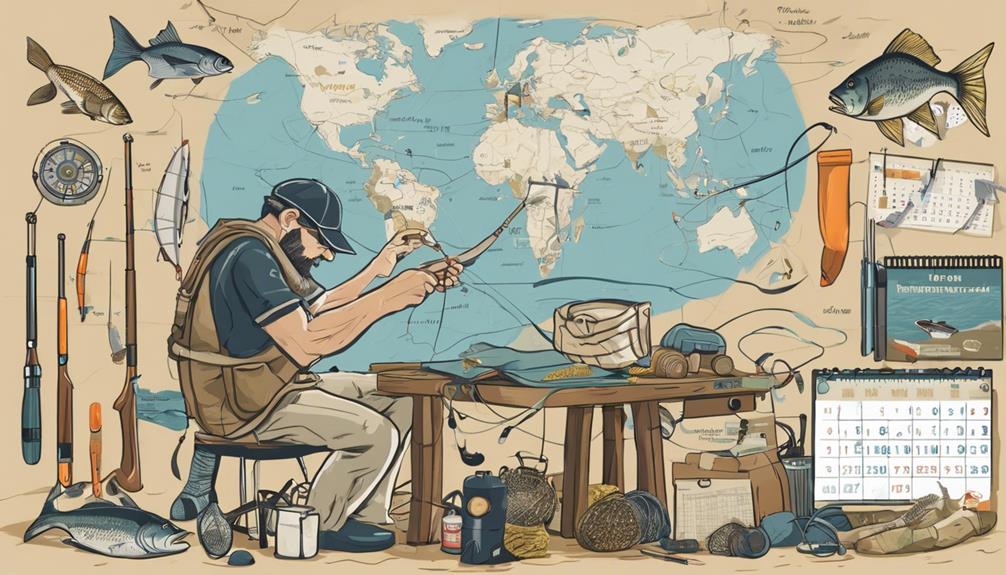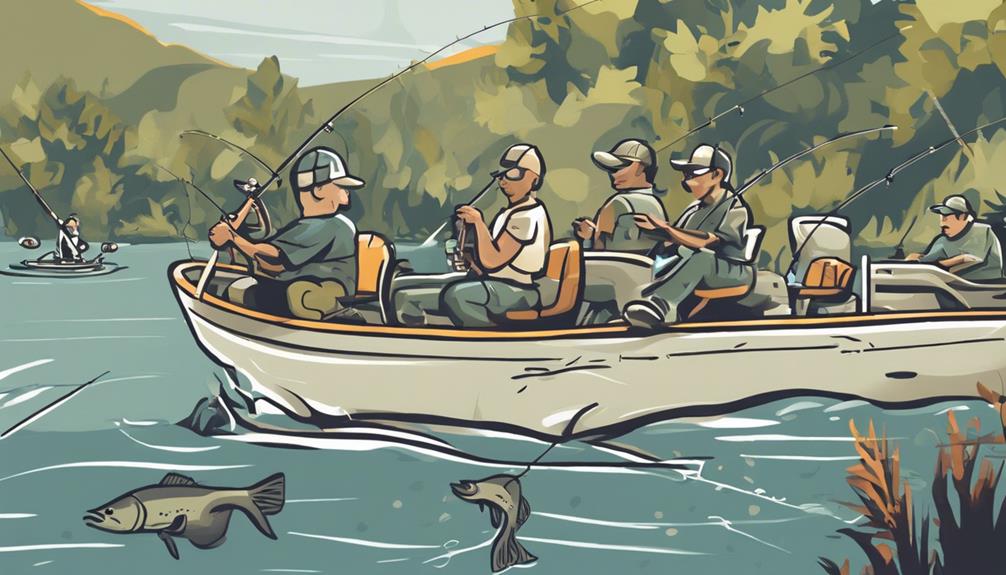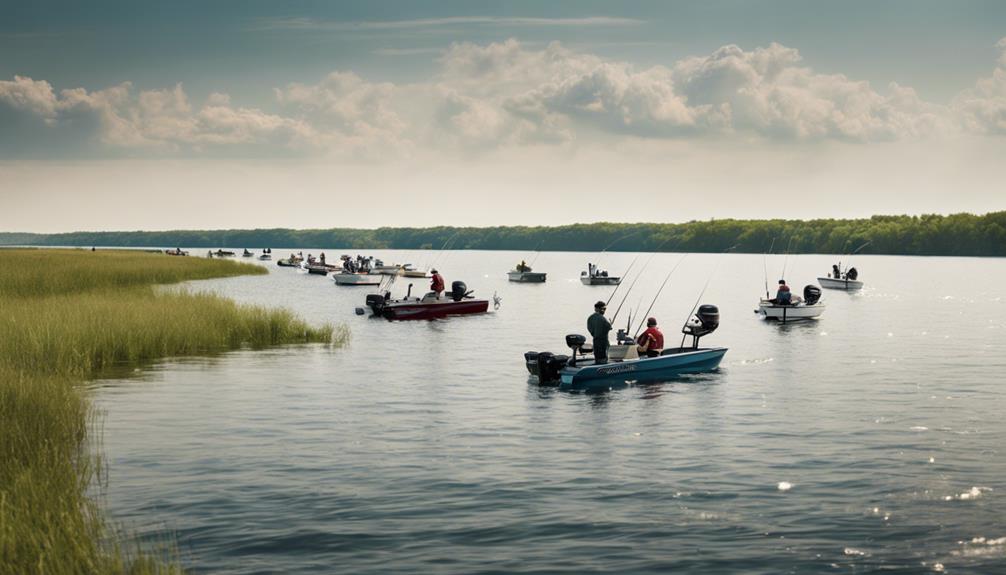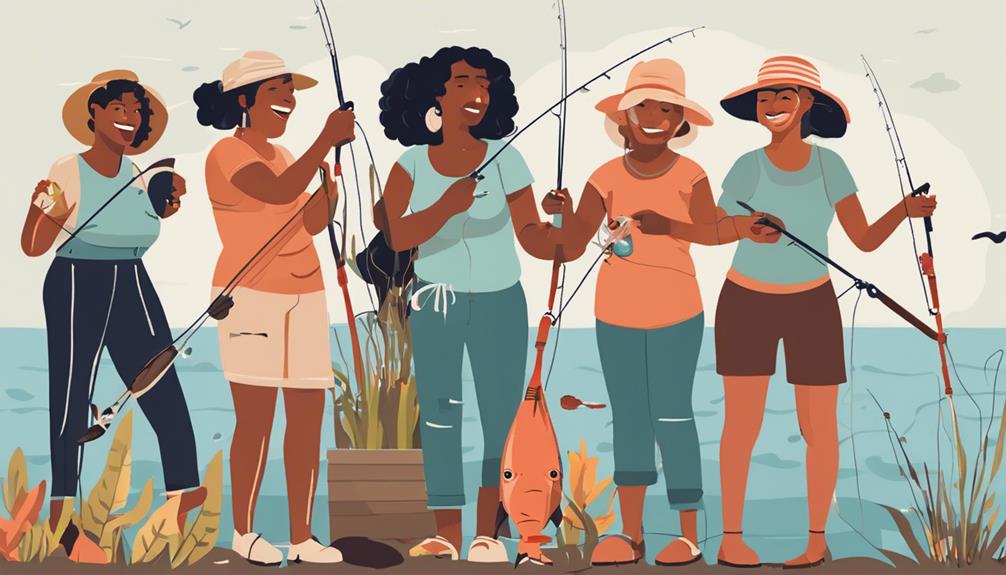Get ready to dominate fishing tournaments! First, research and follow tournament rules closely. Be sure to know the equipment regulations and catch limits. Don't forget to plan and manage your finances wisely. Register early to secure your spot and save money. Organize your gear efficiently for quick access. Study the tournament waters beforehand and adapt your strategies. Understand how points are scored and follow the rules precisely. Show sportsmanship and respect fellow anglers. Lastly, plan your travel and stay updated for any changes. These tips will boost your chances of success in your next fishing tournament!
Research Tournament Rules
Make sure to thoroughly review the rules of the fishing tournament before you participate to avoid any surprises during the competition. Understanding the regulations is crucial to ensure you don't face disqualification due to inadvertent rule violations. Each fishing tournament has its own set of rules and guidelines that all participants must adhere to. These rules typically cover areas such as permissible fishing equipment, bait restrictions, catch measurement methods, and tournament boundaries.
To avoid disqualification, pay close attention to the specific rules regarding catch limits. Exceeding the designated limit can lead to penalties or even being disqualified from the tournament. Additionally, familiarize yourself with any size restrictions on the fish you catch. It's essential to know the minimum and maximum sizes allowed to ensure compliance with the tournament rules.
Another vital aspect to grasp is the tournament's scoring system. Understanding how points are awarded based on factors like fish species, size, and quantity can give you a competitive edge. Make sure you know the proper procedures for submitting your catch for scoring to prevent any point deductions or disqualification.
2. Determine Entry Fees
When determining your entry fees for a fishing tournament, carefully consider the costs involved to ensure proper budgeting for your participation. Proper budget management is crucial to make the most of your tournament experience. Here are some tips to help you manage your entry fees effectively:
- Research Costs: Before deciding on your entry fees, research the tournament costs thoroughly. Consider expenses such as registration fees, travel, accommodation, equipment, and any other additional costs that may arise. By having a clear understanding of these expenses, you can set an appropriate budget for the tournament.
- Fee Negotiation: Don't be afraid to negotiate your entry fees, especially if you have been a loyal participant or if you're registering early. Some tournaments offer discounts for early registration or for returning participants. Negotiating fees can help you save money, allowing you to allocate those funds to other important aspects of the tournament.
- Stay Flexible: Be prepared to adjust your budget if unexpected costs come up. Having a flexible approach to budget management can help you handle any surprises without causing financial strain. By staying adaptable, you can ensure that your participation in the fishing tournament isn't compromised due to financial constraints.
3. Register Early
Consider securing your spot early by registering in advance for the fishing tournament to take advantage of potential discounts and ensure your participation. Early registration benefits not only include cost savings but also guarantee your spot in the competition, as some tournaments have limited spaces available. By registering early, you can avoid the last-minute rush, potential waitlists, or even missing out on the opportunity to participate altogether due to registration deadlines.
Registering early can often lead to discounted entry fees, helping you save money that can be better spent on upgrading your fishing gear or planning for other tournament expenses. Additionally, early registration allows you ample time to prepare for the event, whether it's researching the fishing location, studying the rules and regulations, or organizing your equipment effectively.
Most fishing tournaments have registration deadlines that you must adhere to in order to secure your spot. Missing these deadlines can result in late registration fees or complete exclusion from the tournament. Therefore, it's crucial to mark the registration dates on your calendar and complete the registration process well before the deadline to avoid any last-minute complications.
4. Prepare Fishing Equipment
To ensure a successful fishing tournament experience, equip yourself with the necessary gear and tools tailored for the specific competition requirements. When preparing your fishing equipment, focus on two key aspects: tackle organization and rod selection.
Tips for Preparing Fishing Equipment:
- Tackle Organization: Properly organizing your tackle is crucial for efficiency during the tournament. Invest in a tackle box with compartments to store different types of lures, hooks, weights, and other essentials. Keep your tackle organized based on the fishing techniques you plan to use, making it easier to access the right gear quickly.
- Rod Selection: Selecting the right fishing rod is essential for maximizing your performance during the tournament. Consider the species you'll be targeting and the fishing techniques allowed in the competition. Ensure your rods are in optimal condition, with sturdy reels and lines that can withstand the challenges of tournament fishing.
- Maintenance: Before the tournament, check all your equipment for any signs of wear or damage. Ensure reels are properly lubricated, lines are free of tangles or frays, and rods are structurally sound. Being proactive about maintenance can prevent equipment failures during crucial moments in the tournament.
5. Study Tournament Waters
Studying the tournament waters beforehand is crucial for understanding the environment you'll be fishing in and increasing your chances of success in the competition. To start, explore local knowledge about the waters where the tournament will be held. Local anglers, fishing guides, or even online forums can provide valuable insights into the specific characteristics of the area. Understanding conditions such as water depth, temperature, currents, and the types of fish present will give you a significant advantage.
Before the tournament, take the time to physically visit the tournament waters if possible. This hands-on experience can help you familiarize yourself with the area, identify potential fishing spots, and gauge the overall layout of the water body. Pay attention to any structures, like rocks or submerged vegetation, that could attract fish.
Additionally, consider the seasonal variations that might affect the tournament waters. Factors such as weather patterns, water levels, and fish behavior can change throughout the year, impacting your fishing strategy. By gaining a deeper understanding of these elements, you can adapt your approach accordingly, increasing your chances of a successful tournament.
6. Know Scoring System
Understanding the scoring system is essential for maximizing your performance and strategic decision-making in fishing tournaments. To ensure you're well-prepared, consider the following key points:
- Understand Point Allocation: Different tournaments may have varying point systems for scoring fish. Some tournaments may award points based on the weight of the fish, while others may focus on the length. Make sure you're clear on how points are allocated so you can prioritize catching the right fish to maximize your score.
- Follow Tournament Regulations: It's crucial to adhere to all tournament rules and regulations regarding scoring. Failure to comply with these guidelines could result in penalties or disqualification. Familiarize yourself with the specific scoring rules of the tournament you're entering to avoid any misunderstandings during the competition.
- Stay Informed: Keep yourself updated on any changes to the scoring system or regulations leading up to the tournament. Sometimes last-minute adjustments are made, and being aware of these changes can give you a competitive edge. Stay connected with the tournament organizers or official channels to ensure you have the most current information.
7. Familiarize With Tournament Etiquette
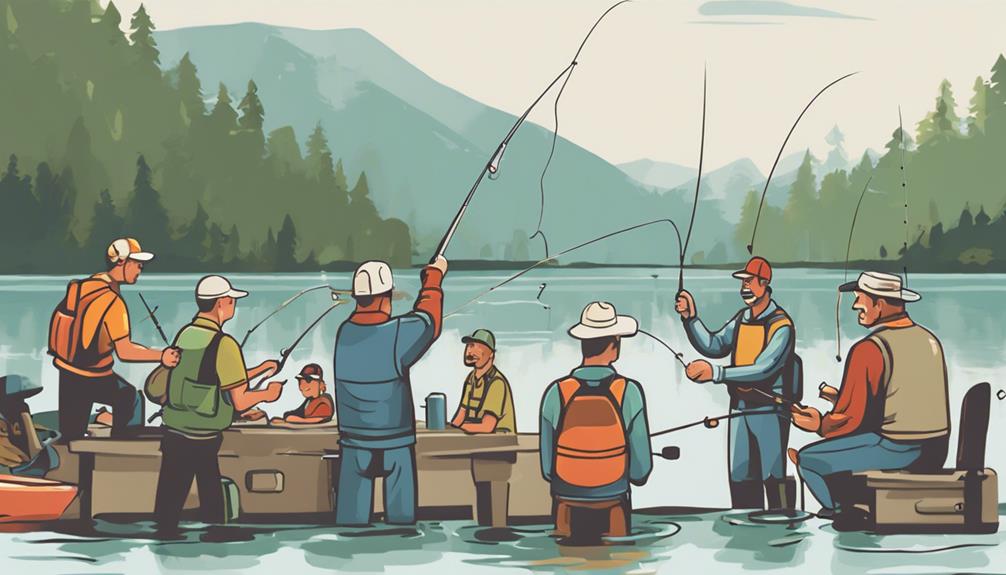
Get acquainted with the expected behavior and norms by familiarizing yourself with tournament etiquette before participating in fishing competitions. Understanding sportsmanship guidelines and etiquette is crucial in maintaining a positive atmosphere during tournaments. Always treat fellow anglers with respect, whether they're experienced competitors or newcomers. Remember to follow catch-and-release protocols and handle fish with care to ensure the sustainability of the sport.
Tournaments also provide social networking opportunities that can lead to valuable connections within the fishing community. Engaging with other participants in a friendly and courteous manner can open doors to new friendships, fishing buddies, and potential mentors. Networking during these events not only enhances the overall experience but can also provide insights and tips that may improve your fishing skills.
When on the water, be mindful of other anglers' space and avoid encroaching on their fishing spots. Respect boundaries and give fellow competitors the same level of consideration you'd expect. Additionally, adhering to tournament rules and regulations demonstrates your commitment to fair play and integrity. By embracing proper tournament etiquette, you contribute to a positive and enjoyable environment for all involved.
8. Plan Travel and Accommodation
When planning your participation in fishing tournaments, make sure to arrange travel and accommodation in advance to ensure a smooth and stress-free experience. Here are some essential tips to help you plan your travel and accommodation effectively:
Travel and Accommodation Tips:
- Packing Essentials: Before heading to the tournament, ensure you pack all the necessary fishing gear, clothing suitable for the weather, sunscreen, hats, sunglasses, and any personal items you may need. It's crucial to be prepared for various weather conditions, so pack accordingly.
- Booking Options: Look into different accommodation options near the tournament location. You can choose from hotels, rental homes, camping sites, or even staying with friends or family in the area. Booking in advance can save you money and secure your preferred choice of stay. Additionally, consider the proximity of the accommodations to the tournament location for convenience.
- Travel Arrangements: Plan your travel to the tournament destination well in advance. Whether you're driving, flying, or taking other means of transportation, make sure to account for any potential delays. Arriving at the location with plenty of time to spare allows you to settle in, relax, and focus on the tournament ahead.
9. Stay Updated With Tournament Updates
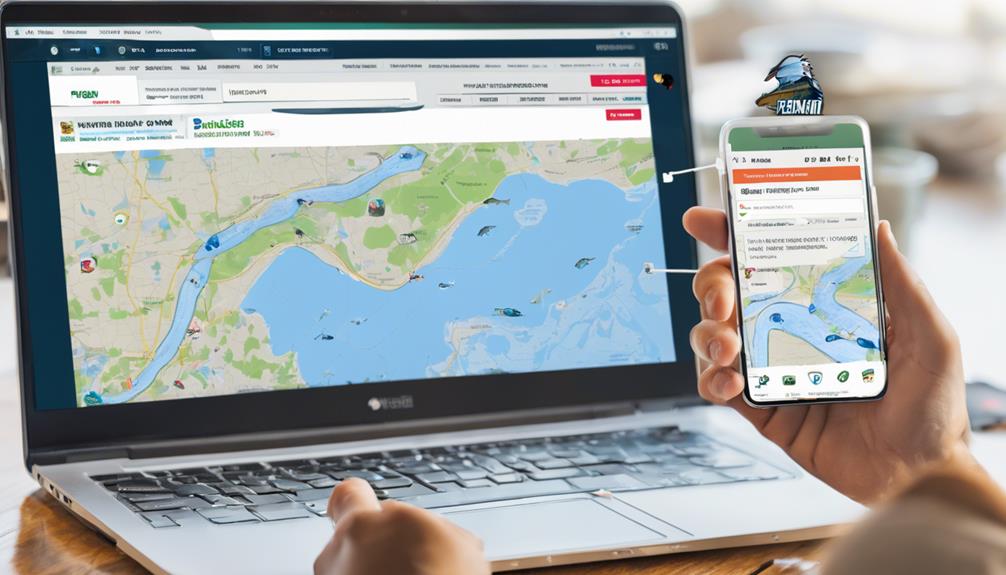
To keep abreast of the latest tournament developments, ensuring you don't miss important updates, it's vital to stay connected and informed throughout the event. One effective way to stay updated is by joining online forums dedicated to fishing tournaments. These forums are treasure troves of information where participants, organizers, and enthusiasts share real-time updates, strategies, and any changes to the tournament schedule. Engaging in these forums not only keeps you informed but also gives you a sense of community and camaraderie with fellow anglers.
Another essential tool for staying updated is to follow the tournament's social media accounts. Most fishing tournaments have active social media presences where they regularly post announcements, results, and any last-minute changes. By following these accounts, you ensure that you receive notifications directly to your feed, keeping you in the loop at all times. Social media platforms also provide an opportunity to interact with other participants, ask questions to the organizers, and even share your own experiences during the tournament.
Frequently Asked Questions
How Can I Mentally Prepare for the Pressure of a Fishing Tournament?
To mentally prepare for the pressure of a fishing tournament, focus on mental toughness and visualization techniques. Picture yourself handling challenges with ease, staying calm under pressure. Remind yourself of past successes to boost confidence.
Practice deep breathing to stay centered. Visualizing your success can help alleviate anxiety and build your mental resilience.
Stay positive, trust your skills, and believe in yourself to conquer any tournament pressure.
Are There Any Restrictions on the Types of Bait or Lures Allowed?
When you're gearing up for a fishing tournament, it's crucial to know the rules about bait restrictions and lure regulations.
Make sure you check the tournament guidelines for any specific requirements on equipment limitations or fishing guidelines.
Following these rules will ensure you're in compliance and ready to reel in those big catches.
What Should I Do if Bad Weather Affects the Tournament Schedule?
If bad weather affects the tournament schedule, stay updated on any rescheduling announcements. Tournament organizers typically have a weather contingency plan in place.
Be prepared for potential changes in timing or location due to inclement weather. Stay in communication with the tournament officials for updates and instructions in case of any modifications.
Your flexibility and readiness to adapt to the changing conditions will help you navigate any weather-related challenges during the tournament.
Can I Bring a Friend or Family Member to Watch Me Fish?
Yes, you can bring a friend or family member to watch you fish in most tournaments. However, make sure to check the spectator rules beforehand.
Having a support system there can boost your morale and make the experience more enjoyable. Just remember to follow any guidelines set by the tournament organizers to ensure a smooth and fair competition for all participants.
How Do I Handle Disagreements With Other Competitors During the Tournament?
When disagreements arise with competitors during a tournament, remember the importance of conflict resolution and sportsmanship. Stay calm, address the issue directly but respectfully, and focus on finding a solution together.
Good etiquette and clear communication are key. Keep in mind that everyone is there to enjoy the sport and showcase their skills.
Conclusion
Now that you have the key tips for entering fishing tournaments, you're ready to reel in some big wins!
Remember to do your research, prepare your gear, and familiarize yourself with tournament rules and etiquette.
By registering early, planning ahead, and staying updated on tournament updates, you'll set yourself up for success on the water.
Good luck and tight lines!
